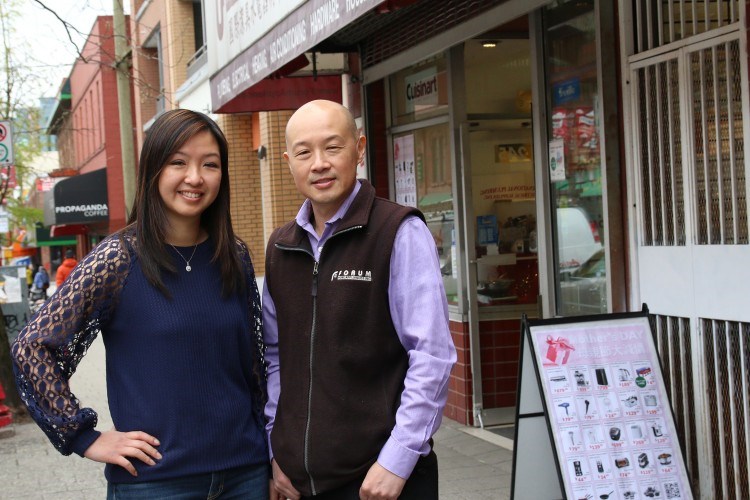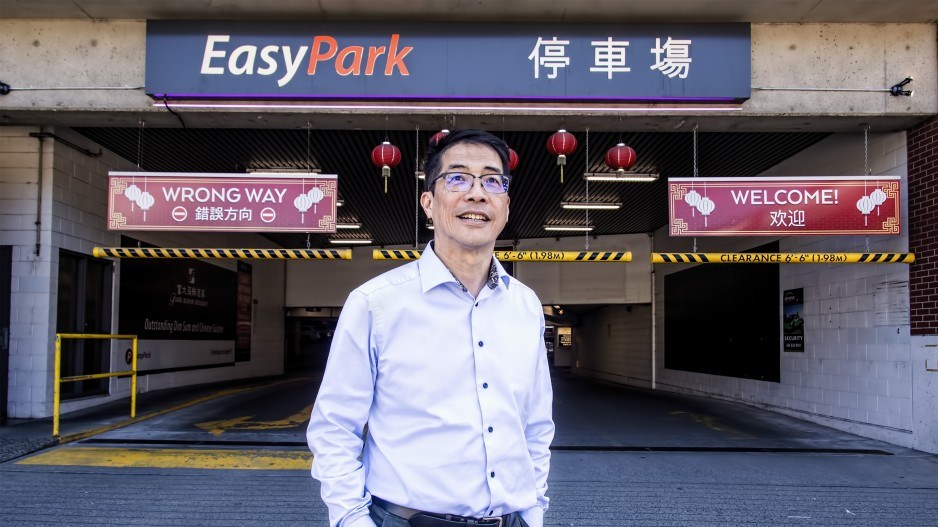Few subjects spur more controversy among Vancouverites than parking.
Drivers lament the cost and scarcity of parking spaces while pedestrian advocates bemoan how much space the city provides to accommodate cars. More roads, they say, could be used for pedestrians only, with curb lanes turned into patios and bike-share stations.
Vancouver city councils past and present have been reluctant to make sweeping city-wide changes to how residents pay for parking, instead preferring neighbourhood-by-neighbourhood approaches – such as one to make all metered parking in Chinatown $2 per hour throughout the day and evening, starting June 1.
What is certain is that, as years pass and major developments happen in areas such as the south end of Burrard Bridge, there will be plenty of heated debates around how much parking is sufficient and how it should be priced.
Chinatown proposal gets merchant support
Parking meters in Chinatown – between Pender and Union streets, from Gore Avenue up to the International Village Mall – are set to charge $2 per hour between 9 a.m. and 10 p.m. every day starting June 1 as part of a pilot project that runs until the end of 2024.
Rates for those meters now range between $1 and $5 per hour between 9 a.m. and 6 p.m., and $1 to $3 per hour between 6 p.m. and 10 p.m.
“This is what our members have been asking for a long time,” Chinatown Business Improvement Association president Jordan Eng told BIV.
The intent is to revitalize the area and provide businesses’ customers more certainty for how much they will have to pay, he said. The current system is a hodgepodge where confusion reigns, he added.
“The city comes with their stats and analysis and says, ‘Well, we put this parking meter at $5 per hour because we can show that it’s used 100 per cent of the time, and two blocks away, we’ll put the rate at $1 because it’s used less,’” Eng said.
He said the city could do even more for the area by making security guards more prominent at its city-owned EasyPark parkade at Chinatown Plaza, and by having better signage directing people to that parkade.
Several people told BIV that the parkade is largely empty most days and is only mostly filled when large events happen at Rogers Arena or BC Place.
That emptiness during most days and evenings can make some people reluctant to park there because they fear for their safety, Eng said.

Eng and merchants, such as Forum Home Appliances principal Tracy To, told BIV that most metered parking spots in Chinatown are already filled during the day – i is a phenomenon that may mean that lowering parking prices will not substantially add visitors to the area.
Lower parking rates may prompt visitors to linger, thereby reducing the turnover of parking spots, and causing fewer drivers to be able to visit Chinatown.
Nonetheless, To supports the initiative to have lower parking rates outside her store because she said customers sometimes complain about high parking costs.
She said high parking prices could be a deterrent to customers who could go elsewhere to buy small appliances.
The change in parking pricing may not turn out to be permanent.
City coun. Pete Fry told BIV that he supported launching the new system as a pilot project to see if it will help revitalize the area, but he will wait to see data to determine if he thinks the project should be made permanent.
“When our engineers and parking guys talk about it, they say that they want to price parking in such a way that we’re encouraging turnover but we’re still encouraging business activity – there’s a balance,” he said.
“It is important that we put a cost evaluation to private use of public space, which essentially is what parking is. If we know it has a value, then we should be charging people appropriately.”
City slowly moves toward metered parking and away from city-wide permits
The City of Vancouver has been increasing its number of metered parking spots despite declining demand for those spaces.
City data shows that there are now about 12,100 parking spaces in Vancouver, or about 1.1 per cent more than the 11,970 spots a year ago. This is up from about 11,500 spots in 2019, before the COVID-19 pandemic.
Metered parking revenue, however, remains below the $58.9 million generated in 2019. The city raked in $52.4 million from metered parking in 2022, up 9.4 per cent from the $47.9 million generated in 2021.
The rise in metered parking across the city can be attributed in part to the city’s shift to parking pay stations, instead of individual meters. The pay stations can include many spots at once, and can more efficiently add new spaces, according to the city.
The rise comes despite the city allowing more businesses to operate patios in curb lanes, thereby replacing parking spots. It also comes as the bike-share company Mobi adds more bicycle stations.
Parking prices in the city range from $1 to $11 per hour depending on how much the meter is used.
The city in recent years created about 200 new metered parking spots on side streets in the Broadway corridor to help encourage parking turnover, according to the city. In some cases, those new spots previously had no time limit.
The Broadway corridor lost about 600 metered parking spots, however, because the B.C. government and its subway-building partners deemed it necessary to remove two lanes of parking between Main Street and Arbutus Street in 2021. Combined, this means the area has lost a net total of about 400 spots in the past few years.
While the city has made moves to try to accommodate residents in areas such as the Broadway corridor, it has been reluctant to take big steps to change parking pricing city-wide.
A 2021 proposal to require parking permits for residential parking on all Vancouver streets failed to pass after major public backlash. Then-mayor Kennedy Stewart cast the deciding vote to kill the proposal.
The initiative would have seen residents in all parts of the city pay $45 or more to buy annual permits – a system that is already in place in some neighbourhoods.
Some amendments to that proposal passed, such as to allow low-income people to apply for a subsidy that would lower their parking pass price to $5 per year.
Fry offered other amendments in an attempt to save the initiative and he told BIV that he was “disappointed” that those amendments did not pass because he still believes that the proposal has merit.
He reiterated that street parking is a public service and that the city needs to put a dollar value on drivers privately using public space.
Sen̓áḵw could be future flashpoint
The Squamish Nation’s Nch’ḵay̓ Development Corp. last year broke ground on the first part of its planned 6,000-unit Sen̓áḵw rental development on the south side of Burrard Bridge.
Early data on the project estimated that it would contain 886 parking spaces and accommodation for 4,477 bikes.
No one at Nch’ḵay̓ responded to BIV by deadline, but a Squamish Nation representative not authorized to speak with media told BIV that the amount of bicycle parking has since increased.
It is unclear how much vehicle parking the city might have required the project to have because the development did not need city approval.
The federal government gave the Squamish Nation a $1.4 billion loan to build the project on Squamish Nation land.
City documents show that the city does not require any minimum number of parking spots in new residential developments in the downtown core.
In Southeast False Creek, however, the city requires a minimum of one parking space for each 1,560.767 square feet (or 145 square meters) of gross floor area.
The Squamish Nation calculates that its development will have about four million square feet of space. That would translate into 2,563 required vehicle parking spaces if the city had authority to mandate parking, and used its guideline for Southeast False Creek.
Squamish representatives have long said that they anticipate that tenants who rent space in the development will not want to rely on vehicles. They expect to have discussions with TransLink about how to improve bus service to accommodate higher demand for public transit, a Squamish Nation representative told BIV.
The project has rattled neighbours.
Kits Point Residents Association directors have criticized the city for not adequately consulting neighbours before entering a services agreement for the site.
The association and two directors have filed for a judicial review in B.C. Supreme Court in an attempt to get a judge to quash the agreement.
They also fear that the development will attract drivers who park in the Kits Point neighbourhood and walk to Sen̓áḵw.
Walter Block, who is an economics professor at Loyola University New Orleans and who lives in North Vancouver about six months each year, dismissed the Kits Point residents’ concerns as an “externality,” and said the Squamish Nation should be able to solely determine how many parking spots they need in their development.
Block, who identifies as a libertarian and wrote the 2009 Mises Institute book The Privatization of Roads and Highways, said the city should not have any authority to tell private developers what to do on their land.
“The key is that if the owner of a building doesn’t have enough parking spots, he’s gonna lose his shirt,” Block said. “Why would the city be in a better position to determine the optimal number of parking spots than the owners? If the owners mess up, they lose. If the government messes up, it doesn’t lose [money].”
He said that the Squamish Nation’s situation, where they are not bound by city restrictions, is a needed “market test” to determine if building far fewer parking spots than would otherwise be required is a justified savings for developers. Time will tell if Squamish Nation is able to extract as much rent from tenants in the development as it likely would have been able to do if Sen̓áḵw had been built with more parking spots, Block said.
“You have to leave these things to the market,” he said.
“We need a market test, and we don’t have a market test when a government gets to decide these things.”



